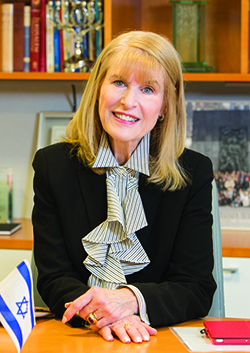Hadassah
President's Column
Long Distance
 According to a midrash, all Jews—those alive at the time of Moses and those from future generations—stood together at Sinai. This is reflected in the Passover lesson obliging us not only to remember our ancestors’ liberation but also to see ourselves as having personally come out of Egypt. a I recently had an experience that brought to mind our forebears in the desert and the similarities and differences between their generation and ours. a For 40 years, the entire
According to a midrash, all Jews—those alive at the time of Moses and those from future generations—stood together at Sinai. This is reflected in the Passover lesson obliging us not only to remember our ancestors’ liberation but also to see ourselves as having personally come out of Egypt. a I recently had an experience that brought to mind our forebears in the desert and the similarities and differences between their generation and ours. a For 40 years, the entire
Jewish people were a single moving camp, a thin line wandering on foot, nurturing an identity and creating a nation.
Early in January, I sat in Jerusalem hosting a conference call about the Hadassah Medical Organization’s role in finding a treatment and cure for amyotrophic lateral sclerosis, also known as Lou Gehrig’s disease. Participating in the call was Dr. Dimitrios Karussis, the Hadassah neurologist who did the first clinical trials using patients’ own stem cells to treat ALS; close to 90 percent showed improvement in respiration and motor function. Though his research was done in Israel, Dr. Karussis was with HMO Chair Dr. Rachel Schonberger in San Francisco, where he reviewed his findings at the J.P. Morgan Healthcare Conference and Biotech Showcase. Also on the phone were Hadassah leaders and donors from all over America.
It struck me that those crisscrossing communication lines stretching thousands of miles, allowing us to discuss a subject with global implications—and a fulfillment of Israel’s mission as a light unto the nations—emanated from that moving desert camp more than 3,000 years ago.
As they left Egypt, our ancestors thought about the future but, just like us, they probably thought in terms of their children and grandchildren. I doubt that they contemplated millennia of struggle and change. At the same time, just as we look to our founding generation for our identity and values, I’m sure they would derive enormous satisfaction from our achievements—from regaining control of Jewish destiny to our ability to conquer disease.
The results of Dr. Karussis’ research have been published in the prestigious JAMA Neurology, and expanded clinical trials using the HMO protocol are now underway at the Mayo Clinic and Massachusetts General Hospital. But Hadassah’s focus on ALS is just one piece of a broad research front. Working on a treatment for multiple sclerosis, our scientists have found that injecting bone-marrow stem cells into a patient’s spinal fluid inhibits inflammation, prevents immune cells from harming the brain and facilitates repair. In the fight against macular degeneration, our researchers are conducting the first clinical trial using stem cells to help restore the retina’s ability to function. HMO’s Cardiovascular Research Institute is collaborating with Mount Sinai Medical Center in New York on gene therapy to replace failing heart cells.
On both the clinical and volunteer fronts, Hadassah spearheads the campaign for Gender Equity in Medical Research (GEM). Most diseases affect both men and women, but clinical studies have always focused disproportionately on men—impeding our understanding of how gender affects prevention, diagnosis, treatment and outcome. Our researchers are conducting cardiovascular studies on gender differences in heart attack symptoms, the effects of anticoagulant drugs and also studying the female heart’s response to menopause. In both Israel and America, Hadassah plays a leading role in advocacy, seeking legislative support for GEM.
The Jewish story started with a single thread in the wilderness and eventually wove its way around the world. As the Haggada teaches us, we are the people who were freed from slavery in Egypt; by the same token, our lives today in Israel or America, France or Iran, Russia or Argentina give meaning to what our forebears began.
For me, the Passover Seder is still the wonderful family event and heritage experience it has always been. But in a new light, I also see it as our annual conference call with all those we met at Sinai.
A zissen Pesach, Chag Pesach Sameach to all.










 Facebook
Facebook Instagram
Instagram Twitter
Twitter
Leave a Reply